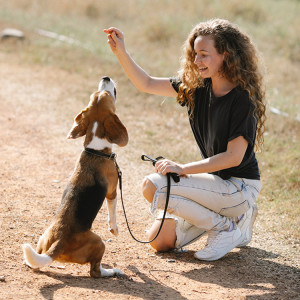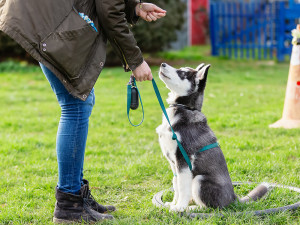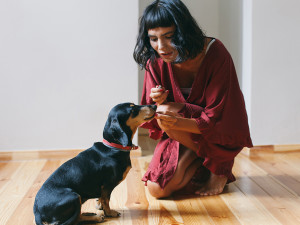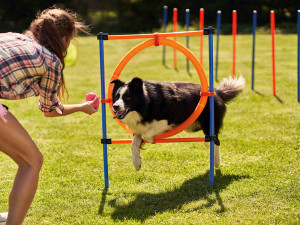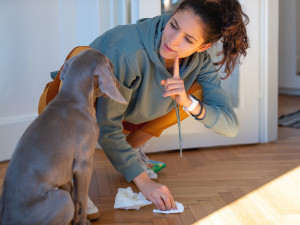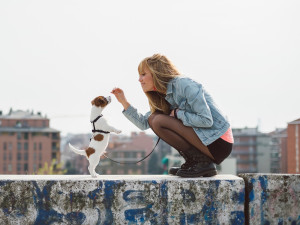Please, Oh Please, Stop Perpetuating the Dominance Dog Theory
The idea of being a dog’s “alpha” is a popular one — but it’s not an effective way to train.

Share Article
As a pet parent, you’ve probably heard about “dominance dog theory,” a popular way of thinking about dog training. Advocates often support their argument by citing scientific evidence — especially data from ethologists — that dogs are pack animals. As such, they argue, dogs don’t need love from us — they just need to know their place. Sigh. It’s true that dogs are highly social animals, but that doesn’t mean they only operate by hierarchical pack rules. When it comes to human-dog relationships, we have to think bigger.
Understanding Dominance Dog Theory
Here are some “rules” under dominance dog theory:
Don’t pet your dog unless they work for it first.
Don’t let your dog move their head so that it is higher than your own.
Don’t feed your dog until after you’ve eaten.
Don’t step around your dog if they’re in your path; make them get up and move, even if they’re sound asleep.
Don’t let your dog sleep with you or cuddle with you on the couch.
Don’t clean up after your dog while they’re watching you.
Why shouldn‘t you do these things? Because each action is said to cause your dog to think they’re dominant over you. Believe me; this isn’t what’s best for your or your dog’s happiness. As many other trainers and behaviorists repeat endlessly in books, blogs, and seminars, dominance is simply a description of a relationship between two individuals who want the same thing.
What Does Dog Dominance Mean?
One animal is said to be “dominant” over the other if they always have primary access to the pork chop that falls on the floor, or the favorite toy, or the cozy lap of a dozing pet parent. Basically, it’s about the resolution of situations in which there might be competition for a resource. It is not about coming when called, or sitting when told to sit, or accepting unfamiliar dogs into the yard.

We’re not even sure how the concept of dominance relates to interactions between dogs, much less to interactions between two entirely different species, such as humans and dogs. At present, thoughtful ethologists and behaviorists are re-evaluating the concepts of “dominance” and “social status” as they relate to the domestic dog. Although there are questions and quibbles about some of the finer points, experts almost universally agree that the concept of “getting dominance” over our dogs is, at best, not useful, and more often is harmful to our relationships with our pets.
The Myth Of The “Alpha Wolf” Lives On
Yet, the idea that we must “dominate” our dogs lives on, zombie-like, in spite of years of research and experience that demonstrates “being dominant” over our dogs does not improve obedience. In fact, we know that using positive reinforcement results in the best behavior, the fewest behavioral problems, and the richest relationships. Given that, the question we need to ask ourselves is this: Why is the concept of achieving dominance over our dogs so seductive? Why is it so hard for people to give up? Given that humans are complex animals, I suspect there are many answers.
Surely, one reason that so many people are enamored of the concept of dominance dog training is that social status is highly relevant to our species. No matter how egalitarian we are, the fact is that in restaurants, some people get better tables than others.
However, we don’t seem to make the mistake within our own species that we make with our dogs, confounding social status or control with teaching or conveying information. Dogs are supposed to come when called, refrain from jumping up on company and walk at perfect heel just because we tell them to. Each of those actions requires learning; they are not natural to dogs and have to be taught.
Dog Training Isn’t That Simple
Maybe another reason we are so susceptible to the fallacy of “getting dominance” over our dogs is that it makes dog training seem simple. One-stop shopping — just get your dog to accept you as “alpha,” and voilà! Your dog will stop jumping up on visitors and will quietly walk through the neighborhood at your side, ignoring all the interesting stuff — ahem, squirrels — they pass on the sidewalk.
It’s appealing to think that one overriding concept will take care of a host of behavioral issues. And hey, how hard could it be to talk your dog into believing that you are the alpha? You’re the one who can open the door, you’re the one who brings home the dog food and you’re the one with the opposable thumbs. But training is much more complicated than that, and time has to be given to associating cues with each individual behavior.
The idea that all we need is respect (cue Aretha here) and our dog will behave perfectly is understandably seductive. Too bad it’s incorrect. Far worse, it can lead, at best, to a dog who performs because they are intimidated, and at worst, to a dog who is abused. The fact is, dogs will respect us only if we are consistent, clear and fair. They will love and trust us only if we are loving and patient and are able to communicate to them in ways that they understand. That does not mean we need to “spoil” them and allow them to behave like rude and demanding house guests. However, we need to teach them how to behave in the society of another species, rather than expecting them to do what you say just because they want to please us.

Patricia McConnell, PhD
Patricia McConnell, PhD, is an animal behaviorist and ethologist and an adjunct associate professor in zoology at the University of Wisconsin, Madison, as well as the author of numerous books on behavior and training.
Related articles
![woman gives small black dog treat for sitting]()
Your Dog Should Do This 30-Day Training Challenge
It’s like your 30-day yoga challenge — except with way more training treats.
![Border collie dog and a woman on an agility field]()
A Crash Course on Dog Agility Training
5 reasons to get your dog in the agility game, from burning energy to building confidence.
![A woman cleaning up pee on the wood floors inside while disciplining a grey puppy with a raised finger of disapproval]()
10 Dog-Training Habits You Should Drop Right Now
Training a dog can seem pretty intuitive — until it’s not.
![Young blonde woman with a Jack Russell puppy during spring in the city.]()
The Best Training Treats for Dogs in 2026
The most mouth-watering treats for training your pup.

